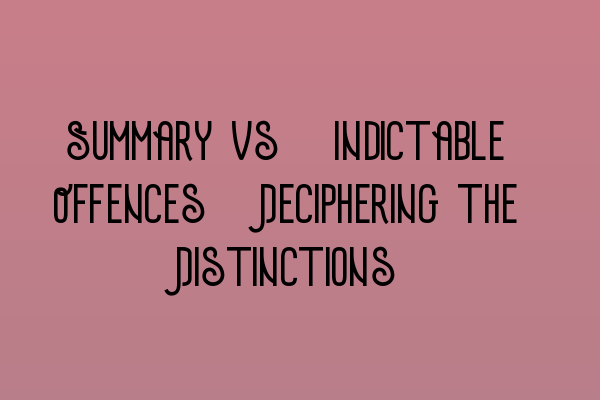Summary vs. Indictable Offences: Deciphering the Distinctions
Introduction
When it comes to criminal law, it is important to understand the differences between summary and indictable offences. These distinctions play a crucial role in the legal process, from the initial charges to the trial itself. In this article, we will decipher the key differences between these two types of offences and explain why it is essential for aspiring solicitors and legal professionals to grasp this concept. If you are preparing for the SQE exams, make sure to check out our SQE 1 Practice Exam Questions and SQE 1 Practice Mocks FLK1 FLK2 for comprehensive preparation.
Summary Offences
Summary offences are less severe criminal offences that are typically heard in the Magistrates’ Court. These offences include minor assaults, thefts, public order offences, and traffic offences. The penalties for summary offences are generally limited to fines, community service, and short prison sentences.
It is important to note that not all offences can be tried summarily. Some offences, such as serious assaults, sexual offences, and drug trafficking, are considered too serious to be dealt with summarily, and must be heard in the Crown Court as indictable offences.
Indictable Offences
Indictable offences are more serious criminal offences that are typically heard in the Crown Court. These offences include murder, manslaughter, robbery, rape, and drug trafficking. The penalties for indictable offences are generally more severe and can include long prison sentences.
Unlike summary offences, indictable offences require a more complex legal process. The initial hearing for an indictable offence takes place in the Magistrates’ Court, where the matter is then referred to the Crown Court for trial. In the Crown Court, the case is presented to a jury, and if the defendant is found guilty, the judge imposes the appropriate sentence.
Hybrid Offences
There are also hybrid offences, also known as either-way offences, which can be tried either summarily or on indictment, depending on the seriousness of the case. These offences include theft, assault causing actual bodily harm, and possession of a controlled substance.
The decision to try a hybrid offence summarily or on indictment is made based on various factors, including the defendant’s previous criminal record, the circumstances of the offence, and the jurisdiction in which the case is being heard.
Conclusion
Understanding the distinctions between summary and indictable offences is crucial for anyone studying criminal law or pursuing a career as a solicitor. It allows legal professionals to properly advise their clients, navigate the legal process effectively, and ensure that justice is served. If you are preparing for the SQE exams, be sure to explore our comprehensive SQE 2 Preparation Courses and SQE 1 Preparation Courses to enhance your knowledge and skills. Stay updated with the latest SRA SQE Exam Dates and embark on your journey to becoming a successful solicitor!
